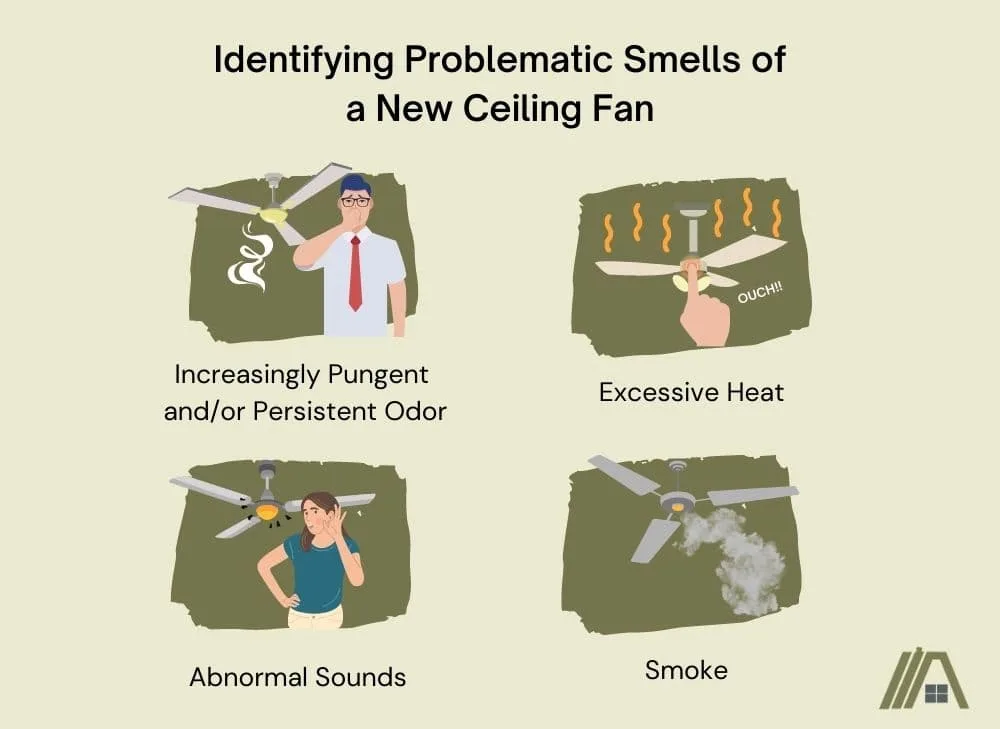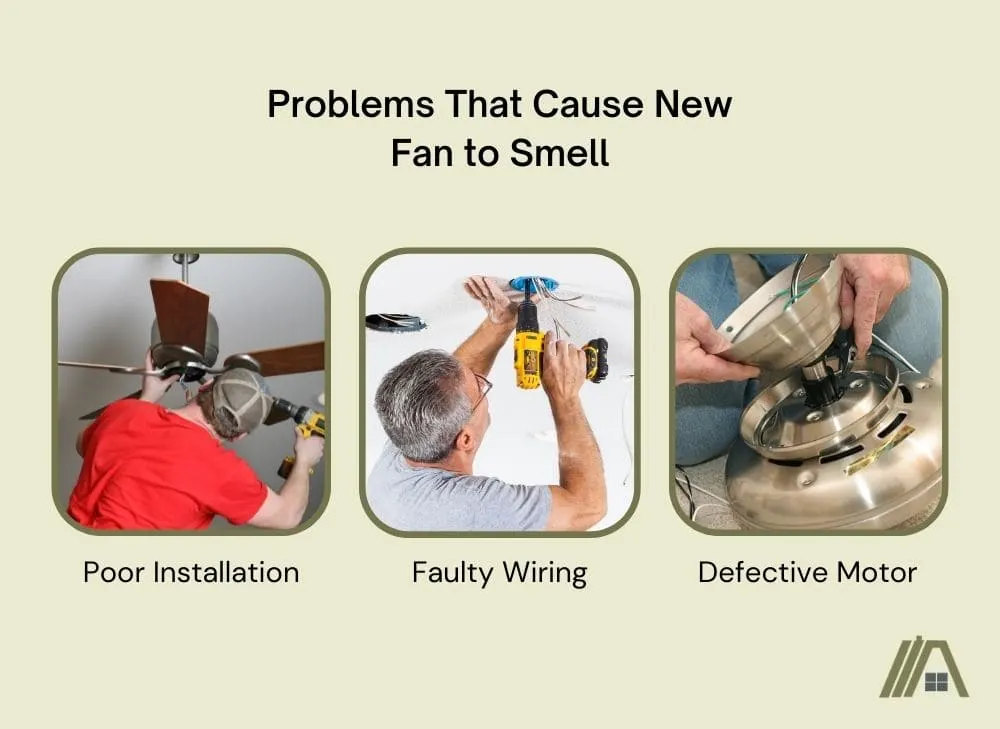Is there anything more frustrating than buying a new item and discovering that it has a weird smell? Whether it’s a new car, furniture, or electronic device, the last thing anyone wants to deal with is a funky odor that may or may not be cause for concern.
There are both normal and problematic reasons for a new fan giving off a smell, and there are ways to distinguish between the two categories.

It is normal for new ceiling fans to smell, so in most cases, no action is required. The smell will disappear within a few hours to a few days. However, if the smell persists, becomes stronger, or is accompanied by noises or excess heat, it may be indicative of a deeper issue.
It Is Normal for a New Ceiling Fan to Smell
Your first response to your new ceiling fan emitting a smell does not have to be panic. It is normal for new ceiling fans to have a strange smell.
The smell can be described as being similar to a new car smell, and it is a common occurrence in other appliances as well. The “new car smell” is caused by VOCs (Volatile Organic Compounds), which are chemicals that are found in many products as a result of the manufacturing process, as well as excess oil/lubricant.
VOCs are found in paint, glues, plastics, and other materials. If you’re smelling a “new car smell,” your ceiling fan was probably made with VOC-containing materials. Molecules of these chemicals are released into the air when you turn on your new ceiling fan for the first time because of friction and heat, which trigger the release of these VOCs.
A little extra oil applied to your new ceiling fan motor helps to keep it in good condition while static. When you start your fan for the first time, this oil can get “burned up”, releasing a funny smell.
The good news is that the odor is not harmful and it will dissipate over time.
Smell Should Disappear After a Few Hours
If the smell you’re experiencing is normal, it will disappear within a few hours to a few days. It will differ for every fan.
Generally, however, the longer your new ceiling fan remains running, the faster the smell will disappear. As the fan runs, the VOCs will dissipate into the air and become undetectable and the excess oil will be burned up.
On the other hand, if the smell does not dissipate, it could be indicative of a problem. Problem smells from your ceiling fan are usually caused by an electrical issue. These smells can be described as burning, smoky, or charred.
If you notice any of these problem smells, it is important to contact a professional electrician and refer to the manufacturer for more information.
Identifying Problematic Smells
To determine whether the smell you’re experiencing is truly indicative of an issue that requires attention, you need to assess the situation. The strange smell will likely be accompanied by several other signs, the most common of which are listed below.
Increasingly Pungent and/or Persistent Odor
If the smell you’re experiencing persists beyond a few days, or if it gets stronger and more pungent over time, this is likely a sign of a deeper issue. Make sure to turn off the fan, leave the room, and open some windows. Once you’ve ventilated the area, contact the manufacturer or call an electrician for help.
Abnormal Sounds
Abnormal sounds coming from your new ceiling fan are a sign that something is not working correctly. These sounds may be caused by improper installation or unbalanced fan blades.
Sometimes, the sounds can be present with the perfectly normal new ceiling fan smell. However, if there is a noise, it is best to address it anyway because it can cause all sorts of other problems and may be dangerous.
There are different types of ceiling fan sounds, including clicking, grinding, humming, and buzzing. They all mean different things and require different solutions. Some sounds may be accompanied by wobbling.
Excessive Heat
Excessive heat is a sign that your ceiling fan may be malfunctioning. If you feel heat coming from the fan or if the blades of the fan seem to be hot to the touch, turn off the fan immediately and contact an electrician.
Smoke
Smoke is an important sign that there is something wrong with your new ceiling fan. If you see smoke coming from the fan, turn it off immediately and switch off the fan’s power at the circuit breaker.
Any time you notice a problem with your ceiling fan, it’s best to contact a professional for help. When in doubt, always err on the side of caution and contact an electrician.
They will be able to troubleshoot the problem with you and help you determine if your ceiling fan needs to be repaired or replaced (this will likely be under warranty because the fan is new).

Problems That Cause New Fan to Smell (What to Do)
In the following sections, you will be presented with ways to fix the issues, but remember, your fan is new. Before you go messing with anything, see if the manufacturer will fix it for free or replace it with a new one. Once you start cutting wires and the like, you will void your warranty.
Poor Installation
Your new ceiling fan may have developed a problem smell because it was not installed properly.
When poor installation is the cause, certain parts of the ceiling fan have not been properly secured and are rubbing against other parts, causing friction.
This type of issue can produce heat and cause a fire, so if your ceiling fan emits a burning smell, turn it off right away.
You can fix poor installation by ensuring that all the parts of your ceiling fan are properly secured. Follow the instructions in the fan’s user manual or hire a professional to address the issue. If you decide to do it yourself, make sure to turn off the fan’s power at the circuit breaker before making any changes.
Faulty Wiring
Alternatively, the problem smell could be caused by faulty wiring.
This type of issue typically generates a burning smell. Wires that should be separate may be touching and causing friction, or there may be certain wires that are overloaded and overheated. If you suspect this to be the problem, it is important to fix the issue. Faulty wires can cause a fire if they are left unaddressed.
To address a wiring issue, the first thing you must do is turn off the fan’s power at the circuit breaker. Once the power is off, take off the ceiling fan’s blades and unscrew the metal plate that covers the wiring.
Check to see if there are any frayed, bare, or damaged wires. If you see any problem areas, cut out the damaged section of wire and use wire connectors (amazon link) to join the new section of wire.
Once you’ve repaired the wiring issue, screw the metal plate back on and reattach the ceiling fan blades. Turn the power back on and test out your ceiling fan to make sure it’s working properly. If the problem persists, contact a professional electrician to take a look at your ceiling fan.
Defective Motor
If the motor is faulty, it can cause a smoky, electrical smell. This is because the motor may be overworking and producing heat.
In other words, it is working too hard to spin the blades. To fix this problem, it may be necessary to replace the motor. To confirm, consult with an electrician or contact the manufacturer.
If you have confirmed the problem and have decided to replace the motor by yourself, you must first turn off the power to the ceiling fan at your circuit breaker. Once the power is off, take off the ceiling fan blades and unscrew the metal plate that covers the wiring. Cut the wires that are connected to the motor and strip about half an inch of insulation off of each wire.
Purchase the correct motor for your ceiling fan per the manufacturer’s directions, and then use wire connectors to join the new motor to the wires. When you’ve connected the new motor, screw the metal plate back on and reattach the ceiling fan blades. Turn the power back on at the circuit breaker and test out your ceiling fan to make sure it’s working properly.
Remember, if you’re not comfortable replacing the motor, it’s always best to contact a professional electrician for help.

Sources
https://ask-the-electrician.com/how-to-solve-ceiling-fan-wiring-problems/ceiling-fans/
https://cars.usnews.com/cars-trucks/best-cars-blog/2016/09/is-that-new-car-smell-toxic
https://www.diychatroom.com/threads/new-ceiling-fan-smell.71934/

